Honorary members
PEN Norways’s honorary members are persecuted authors, journalists and bloggers that we continue to support.
PEN Norway appoints honorary members from persecuted writers, where we commit ourselves to following their case particularly closely. It is the Writers in Prison Committee that follows up the honorary members, and protests against the authorities when they are threatened.
PEN Norway has seven honorary members from five different countries. The seven have been threatened or persecuted in their own country for a long time, or are regularly in danger.
Ales Bjaljatski, Belarus
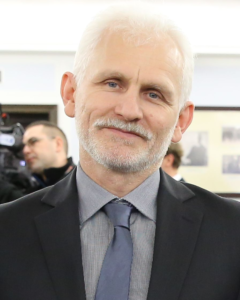
Ales Bialiatski (61) is a leading Belarusian human rights activist and founder of Human Rights Centre Viasna. His dedication to democracy and human rights has made him a central figure in Belarus.
Founded in 1996, Viasna provides financial and legal aid to political prisoners and their families, documents human rights violations, and advocates for reforms in Belarus.
Bialiatski has been repeatedly imprisoned for his activism, including sentences in 2011 and 2023 on widely criticized charges.
Despite risks, Bialiatski continues his activism and has received global recognition, including the Right Livelihood Award and the Nobel Peace Prize (awarded while in prison).
PEN Norway awarded him honorary membership in May 2024 for his commitment to democracy and human rights in Eastern Europe.
“When will you be released? – they asked me. I am already free, in my soul, was my reply.”
Ilham Tohti, Kina
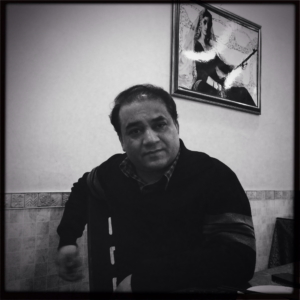
On September 23, 2014, Ilham Tohti (1969) was unjustly sentenced to life imprisonment by Chinese authorities. Since then, he has been incomunicado.
The Uyghur economist and writer has been a sharp critic of the Chinese government’s treatment of the Uyghurs for many years. He has advocated for autonomy in the Xinjiang region and is particularly known for calling for cooperation between the central Chinese government and regional minorities.
In 2006, Tohti founded the website Uighur Online to promote reconciliation between the Uyghurs and the majority population. In January 2014, he was arrested for his writings and activities, and later sentenced to life in prison on charges of “separatism.”
The charges are based on articles he published that expose systematic discrimination and repression of Uyghurs. Tohti has received several awards for his activism.
In April 2014 he was awarded the PEN/Barbara Goldsmith Freedom to Write Award for his long-standing commitment, amidst strong protests from the Chinese authorities.
In 2019, he received the prestigious Sakharov Prize. In 2020, he was made an honorary member of Norwegian PEN.
“I believe that confronting differences is not frightening. What is truly frightening are silenced suspicions and hatred.”
Narges Mohammadi, Iran
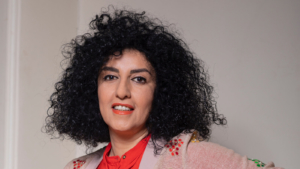
Narges Mohammadi, born in 1972, is an Iranian human rights activist, the Vice President of the Defenders of Human Rights Centre and recognized for campaigning for women’s rights and against the death penalty, earning her the 2023 Nobel Peace Prize.
Mohammadi was active in student politics and faced early repression, including arrests for her activism during university. She wrote for reformist publications, all later closed by authorities.
Since 2003, Mohammadi has worked with the Defenders of Human Rights Centre, documenting violations and supporting activists. She also led the National Council for Peace in Iran.
“Democracy is not a gift, nor a given; it is the hard-earned result of generations of struggle, sacrifice, and resistance”
Despite official bans, Mohammadi continued her activism, resulting in multiple prison sentences, including 11 and 16 years. She remains a leading voice for human rights in Iran despite repeated imprisonment and health challenges. As of 2025 she has been temporarily released due to longstanding health issues from her worsening prison conditions.
Maksim Znak, Belarus
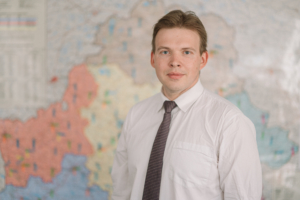
Maksim Znak is a Belarusian lawyer, human rights activist, and author, born in 1981 in Minsk. He has been a key figure in the opposition to Alexander Lukashenko’s regime, serving as legal advisor to Viktar Babaryka and Sviatlana Tsikhanouskaya. Following the 2020 presidential election, widely criticized for fraud, Znak joined the Coordination Council to advocate for democratic reforms.
On September 9, 2020, Znak was arrested by masked men and later charged with conspiracy, forming an extremist group, and inciting threats to national security. The charges were vague, and his closed trial denied him a fair process. In September 2021, he was sentenced to ten years in a high-security prison, where he remains incarcerated today.
“It’s despicable to judge in secret. It’s low. Embarrassing. And indecent.”
Znak has suffered harsh prison conditions, including isolation and constant monitoring. Since February 2023, he has been held incommunicado, denied visits, calls, or letters, even from family or lawyers. All his defense lawyers have been stripped of their right to practice.
Despite isolation, Znak authored The Zekameron (2021), a collection of satirical and philosophical prison writings. The book, translated into several languages, has been acclaimed for its insight into life behind bars and its testament to resilience through literature.
PEN Norway and PEN Belarus have condemned his sentence as politically motivated, advocating for his release. UN committees have classified
his imprisonment as arbitrary and illegal under international law.
Znak is punished for his legal defense of the opposition and for his peaceful advocacy of democracy. His case exemplifies the Belarusian regime’s assault on freedom of expression, the rule of law, and those who defend justice.
İlhan Sami Çomak, Tyrkia
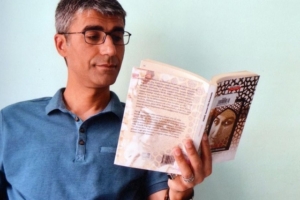
Ilhan Sami Çomak, arrested in 1994 at age 21 for participating in a peaceful demonstration, became Turkey’s longest-serving student prisoner, spending over 30 years in prison before his release in November 2024.
He was charged with terrorism-related offenses, initially sentenced to death, later commuted to life imprisonment, and always denied the charges. PEN Norway actively campaigned for his release.
During imprisonment, Çomak began writing poetry and published eight books, with some poems translated into English.
Can Dündar, Tyrkia
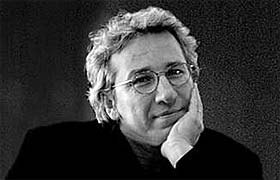
Can Dündar.
Can Dündar is an exiled Turkish journalist and honorary member of PEN Norway. As chief editor of Cumhuriyet, he was arrested in 2015 for revealing state secrets and spent 92 days in detention before release.
Dündar holds advanced degrees and has published over 20 books, produced TV programs, and directed documentaries, including “Mustafa” (2008).
His investigative journalism brought him into conflict with the Erdoğan regime, particularly after reporting on illegal arms shipments in 2015.
Dündar and colleague Erdem Gül were arrested and charged with aiding a terrorist organization and espionage, charges they denied. After months in solitary confinement, Dündar was released, though the trial continued. In 2016, he survived an assassination attempt outside the courthouse. He was sentenced to nearly six years in prison for disclosing state secrets; Gül received a similar sentence.
Dündar fled to Germany amid a crackdown on journalists after the 2016 coup attempt and continues to advocate for press freedom from exile. In 2020, Dündar was sentenced in absentia to over 27 years in prison. PEN Norway honored him as an honorary member in recognition of his fight for freedom of expression.
Aslı Erdoğan, Tyrkia
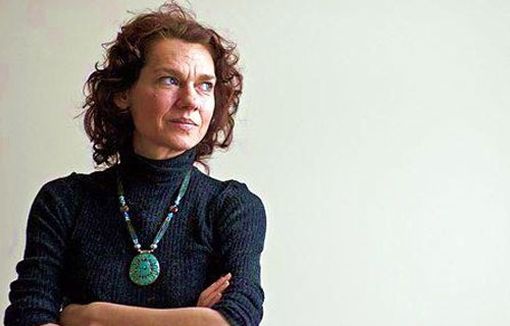
Asli Erdogan.
Aslı Erdoğan is a celebrated Turkish novelist, physicist, and human rights activist. Formerly a columnist for Özgür Gündem, she was arrested in 2016 over terrorism-related charges linked to her journalism. Erdoğan is a political prisoner and author of several award-winning books translated into many languages. She is recognized for her unwavering commitment to literature and activism.
Trained as a physicist, Erdoğan worked at CERN before turning to writing. Her award-winning novels, including “The City in Crimson Cloak” and “The Stone Building,” have been translated into over fifteen languages.
Erdoğan’s body of work spans poetry, stories, and novels. She is also known for her prolific journalism and activism, especially for advocating freedom of expression and ethnic equality.
Following the 2016 coup attempt in Turkey and the closure of Özgür Gündem, Erdoğan was detained and later released. She now lives in exile in Germany.
Erdoğan has served as PEN’s Turkish representative for imprisoned writers, and in 2016, PEN Norway awarded her honorary membership for her courage and literary achievements.
Edward Snowden, USA

Edward Snowden.
Joseph Edward Snowden was born in 1983. A system administrator and computer security expert, Snowden has become the most well-known whistleblower after he disclosed that the American government had been illegally monitoring the internet and collecting data of millions of users, including those of private citizens and public offices.
Besides the direct involvement of the American government, Snowden also demonstrated that several companies collaborated with the National Security Agency (NSA) in this massive surveillance operation. Such scheme represents a high threat to freedom of expression and privacy on the internet, and Snowden brought the case to light in order to defend these basic rights.
A high school drop-out, Snowden rose quickly working with computer security systems for the American Government and public contractors. He studied computers at Anne Arundel Community College in Arnold, in Maryland, and also spent four months training for the Army Reserves, though he did not complete his training due to an injury.
He started working at the university of Maryland’s Center for Advanced Study of Language as a security guard at, but shortly after that he started working with IT for the CIA. He left his work, but continued working to the American government through various private contractors that provided services to the NSA. It was during this times between 2006 and 2012, approximately, that he saw how far the NSA reached and was willing to reach in terms of surveillance, national and international, under the pretext of keeping the United States safe from terrorist attacks.
Snowden spent a great deal of time collecting data and building a dossier about the case. His idea was to blow the whistle in order to let the people decide if they agree to that surveillance operation or not. He was working at an NSA base in Hawaii when he took a medical leave and flew to Hong Kong, from where he could not be extradited. Ha had also contacted journalist Glen Greennwald and documentarist Laura Poitras and revealed to them the scheme. Snowden exposed not only what the NSA had performed until that moment, but their plans to expand their surveillance.
The first story about the case was released on 6th June 2013 and his identity was disclosed, under his request, on 9th June. On 21st June he was formally accused by the U.S. Department of Justice of theft of government property and of violating the Espionage Act of 1917. His passport was revoked while he was in Moscow, and though his final destination was Ecuador, he had to remain in Russia. Later he was granted asylum in Russia, where he is still living, as he has not received the pardon from the American government.
Edward Snowden has become a voice for free speech and privacy, and the ethical use of the internet, and has collected several prizes for his disclosure. Though many may consider him a traitor, his attitude demonstrates, in fact, how much he believes in the American Constitution, of which he kept a copy on his desk while working for the NSA. Since the First Amendment ensures the right to freedom of expression, he could not “in good conscience allow the U.S. government to destroy privacy, internet freedom and basic liberties for people around the world with this massive surveillance machine they’re secretly building”.
In 2016, Edward Snowden was awarded the Ossietzky Prize, PEN Norway’s award for extraordinary efforts for freedom of expression.
Khadija Ismayilova, Aserbajdsjan
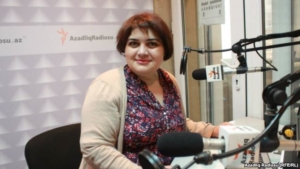
Khadija Ismayilova.
Khadija Ismayilova is Azerbaijan’s leading investigative journalist, known for exposing high-level corruption involving government officials and multinational companies. Despite smear campaigns and harassment, she remains dedicated to independent journalism.
Ismayilova has exposed human rights abuses, advocated for political prisoners, and led Radio Free Europe/Radio Liberty’s Azerbaijani service.
Her reporting on the Aliyev regime’s wealth has led to years of threats, surveillance, and government attempts to silence her.
Ismayilova was arrested in 2014 on fabricated charges, widely seen as retaliation for her reporting. Many of her investigations were later validated by the Panama Papers.
In 2015, Ismayilova was sentenced to over seven years in prison on charges mirroring the corruption she exposed. International organizations, including PEN, condemned her imprisonment as part of Azerbaijan’s crackdown on free expression.
Julian Assange, Australia

Julian Assange, an Australian computer programmer, founded WikiLeaks, an international nonprofit whistleblowing organization established in Iceland in 2006. He faced severe espionage and hacking charges in the United States, with a potential 175-year maximum sentence, before being released in June 2024.
These charges pertain to his alleged hacking of government computers and espionage, involving the acquisition and publication of hundreds of thousands of classified documents between 2010 and 2011. He was held in Belmarsh prison in the United Kingdom since 2019 and fought extradition.
PEN Norway awarded the Ossietzky Prize for 2023 to Julian Assange in recognition of his critical journalism and commitment to exposing abuse of power and war crimes.
In June 2022, PEN Norway granted Assange honorary membership for his dedication to upholding freedom of expression in Western society. He accepted PEN Norway’s honorary membership, sending a message through his partner and attorney, Stella Assange: “Julian is very grateful for being given honorary membership of PEN Norway. This show of solidarity keeps Julian’s spirits strong as he fights an epic battle for his life and the future of European freedom. A tribute that brings him one step closer to regaining his freedom.”
Salman Rushdie
 Salman Rushdie, the author of thirteen novels, is a distinguished writer, celebrated with numerous prestigious awards, including the Whitbread Prize for Best Novel (twice), the Writers’ Guild Award, the James Tait Black Prize, and the European Union’s Aristeion Prize for Literature.
Salman Rushdie, the author of thirteen novels, is a distinguished writer, celebrated with numerous prestigious awards, including the Whitbread Prize for Best Novel (twice), the Writers’ Guild Award, the James Tait Black Prize, and the European Union’s Aristeion Prize for Literature.
He has also received international honors, such as the French Prix du Meilleur Livre Étranger and the Budapest Grand Prize for Literature. Rushdie holds honorary doctorates and fellowships from various European and American universities, serves as an Honorary Professor in the Humanities at M.I.T., and is a Distinguished Professor at Emory University. Currently, he is a Distinguished Writer in Residence at New York University and an honorary member of P.E.N. Norway.
Throughout his career, Rushdie has explored cultural connections and ruptures, displaying outstanding courage in his literary pursuits despite personal sacrifices. He faced a death sentence from the Iranian clerical regime and years in hiding, yet he never wavered in his commitment to literature.
The assassination attempt on William Nygaard, the former CEO of Aschehoug and later chairman of PEN Norway., in 1993, created a special bond between Salman Rushdie and PEN Norway due to Aschehoug’s publication of “The Satanic Verses.”
In response to threats from Iran, Salman Rushdie played a crucial role in initiating the ICORN program. Administered by PEN in Norway, this program has protected hundreds of other writers, journalists, and artists facing threats similar to those faced by Rushdie over the past 30 years.
The knife attack on Rushdie in August 2022 had a deep impact on many, including PEN Norway. Today, it is more crucial than ever to support literature, Salman Rushdie, and the right to free expression for all writers.


